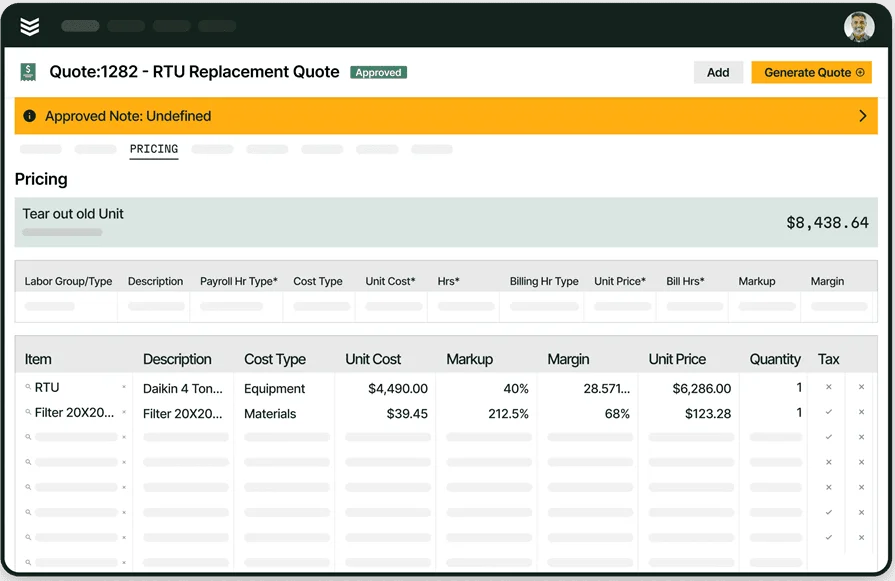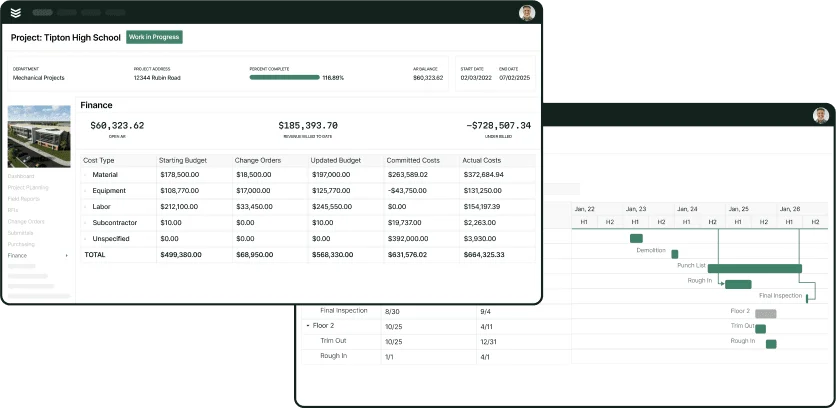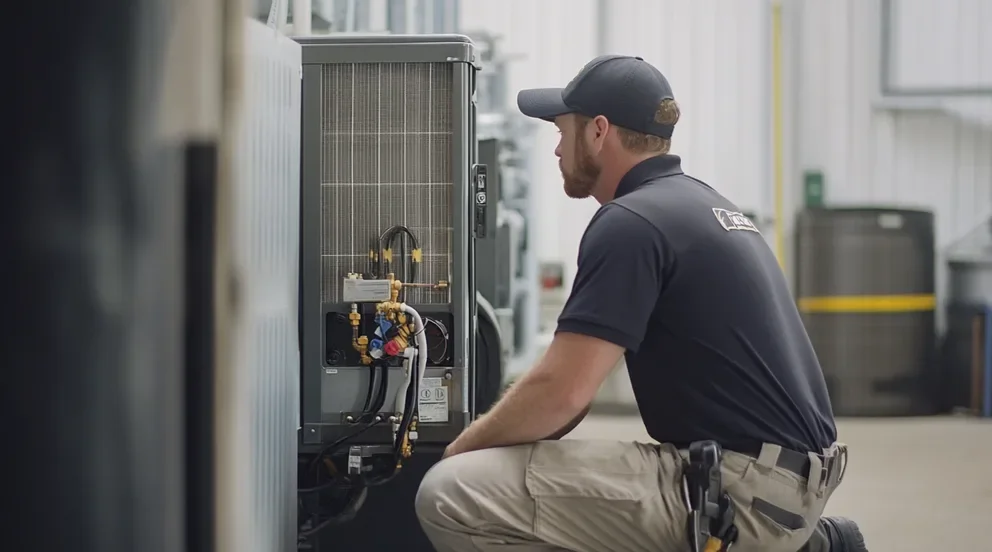For a small business in the HVAC industry, every job counts. Missed appointments, slow invoicing, or a messy schedule can cost you customers and profit. The right HVAC software keeps your business running smoothly—scheduling jobs faster, tracking payments, and making sure nothing slips through the cracks. But with so many options out there, which one actually fits your needs?
In this guide, we’ll break down:
- Choosing the right HVAC service software for your small business
- 6 key features to look for in an HVAC software for small business
- 10 best HVAC software for small business companies
- 5 benefits of using HVAC software for your small business
- 4 important small business HVAC software FAQs answered
Before diving into specific features and software recommendations, let’s start with the big question—how do you pick the right HVAC service software for your business?
Choosing the right HVAC service software for your small business
Small HVAC businesses don’t have time for clunky software that slows them down. The right system should help schedule jobs, manage invoices, and keep everything running without extra hassle. Here’s what to consider before making a decision:
- Pricing and Scalability – Will the cost fit your budget now and as you grow? Are there additional fees for more users or advanced features?
- Ease of Use – How simple is it for your team to get up and running? Will it take hours of training, or is it intuitive enough to start using right away?
- Mobile Accessibility – Can technicians update job details, send invoices, and access schedules from the field? Is the mobile app reliable?
- Integration with Other Tools – Does it connect with accounting software, GPS tracking, or inventory management systems you already use?
- Customer Support and Updates – Is there a responsive support team when issues come up? How often does the software get improvements and new features?
- Features – Does it include what your business actually needs—like automated scheduling, invoicing, or real-time job tracking? Are key tools built-in, or will you need extra add-ons?
With the right questions in mind, the next step is knowing which features make a real difference. Let’s look at the must-haves for HVAC software.
6 key features to look for in an HVAC software for small business
The right software keeps jobs moving, customers happy, and cash flow steady. For a small HVAC business looking to grow, these features make all the difference:
1. Smart scheduling & dispatching
The right HVAC software helps you manage your workload by helping you schedule jobs and dispatch technicians to complete work orders. Assign the right techs to the right jobs without the back-and-forth. Smart scheduling considers availability, skill set, and location, while real-time dispatch updates keep everyone on track. No more double bookings or wasted trips.
2. Mobile access for technicians
Techs should have everything they need in the field. A mobile app lets them check schedules, update job statuses, capture customer signatures, and process payments—without calling the office. With a technician mobile app, field teams stay connected, reduce delays, and complete jobs faster.
3. Automated invoicing & payments
Invoices should be sent themselves. Once a job is done, the software generates an invoice, integrates with payment platforms, and sends automated reminders for outstanding balances. Faster billing means faster payments, and with software specializing in HVAC invoicing and payments, getting paid is easier than ever.
4. Customer & job history tracking
Every service call should feel like a return visit. A built-in CRM tracks job history, equipment details, and past issues, so techs arrive prepared. No more digging through paperwork or guessing what was done last time. With CRM software, all customer data is in one place, keeping service seamless and professional.
5. Inventory & equipment management
Running out of parts slows jobs down. A solid inventory system tracks usage, alerts you when stock is low, and syncs with suppliers for easy restocking.
6. Reporting & analytics
Know what’s working and what’s not. Job completion times, revenue trends, and technician performance should be easy to track. Better data means better decisions and fewer wasted hours. Explore HVAC field reporting and analytics tools to keep your business on track.
Other valuable software features for HVAC service companies
Some extras that can make daily operations even smoother:
- Route Optimization – Finds the fastest routes to job sites, saving time and fuel costs.
- Integrated Marketing Tools – Automates follow-ups and email campaigns to bring in repeat business.
- Team Communication & Collaboration – Keeps office staff and field techs connected with built-in messaging.
10 best HVAC software for small business companies
Finding the right HVAC software can make or break a small business. The best tools help with scheduling, invoicing, dispatching, and customer management—without adding extra headaches. But not all software is built the same. Some work better for commercial contractors, while others cater to residential service providers or general contractors.
Below, we’ve rounded up the top 10 HVAC software options based on what they do best, so you can find the right fit for your business.
1. Best for small business commercial contractors: BuildOps
BuildOps is designed specifically for commercial HVAC businesses. It combines scheduling, dispatch, invoicing, and project tracking into one system, making it easy to manage jobs from start to finish. The platform also includes real-time field-to-office communication and advanced reporting tools.
How Pricing Works: We provide weekly live demos and the opportunity to schedule a customized session where we help you explore features and select the best option for the needs of your small business.
What Sets It Apart for Commercial: Built specifically for commercial contractors, with features designed to manage large job sites, track multi-location clients, and provide in-depth performance insights.

BuildOps HVAC service software
End-to-end field service management for commercial HVAC contractors.
2. Best for residential small businesses: Housecall Pro
Image Source: Housecall Pro
Housecall Pro is a solid choice for small residential HVAC businesses. It offers easy scheduling, invoicing, and customer management tools, all accessible through a mobile-friendly interface. The platform includes automated reminders, online booking, and a payment processing system to streamline operations. However, it’s primarily designed for residential service businesses, so commercial contractors handling larger projects may find it lacking in advanced job management tools.
How Pricing Works: Subscription-based pricing with tiered plans depending on team size and feature access.
What Sets It Apart for Residential: User-friendly design and automation tools make it ideal for smaller teams handling home service calls.
Focus on residential HVAC? Discover how Housecall Pro’s HVAC service software helps home service businesses simplify scheduling and payments. You can also see how Housecall Pro compares to BuildOps right here.
3. Best software for small business HVAC general contractors: Jobber
Image Source: Jobber
Jobber is a flexible platform designed for HVAC general contractors handling a variety of service requests. It offers job scheduling, invoicing, and client management, with an emphasis on workflow automation. The software also integrates with QuickBooks and Stripe for seamless financial management. While great for smaller teams, Jobber may not provide the level of customization and in-depth reporting needed for larger, more complex commercial operations.
How Pricing Works: Monthly and annual subscription plans with different pricing tiers based on user count and advanced features.
What Sets It Apart for General Contractors: Built for businesses that manage multiple job types and need customizable workflows to keep operations running smoothly.
Need a better way to manage multiple job types? See how Jobber’s HVAC service software helps general contractors organize their workflow.
4. Best for businesses expanding into new markets: Service Fusion
Image Source: Service Fusion
Service Fusion is designed for HVAC companies looking to grow into new service areas. It offers job scheduling, invoicing, GPS tracking, and customer management in one cloud-based system. Remote accessibility makes it easy to manage multiple locations. That said, its interface can feel outdated, and businesses needing advanced reporting or deeper integrations may find its capabilities somewhat limited.
How Pricing Works: Flat-rate monthly subscription with no per-user fees.
What Sets It Apart: Great for businesses expanding into new territories that need a scalable, centralized system.
Growing your service area? See how Service Fusion’s software helps multi-location HVAC businesses.
5. Best for automating HVAC office operations: FieldEdge
Image Source: FieldEdge
FieldEdge is built for businesses that want to streamline office workflows. It automates dispatching, invoicing, and QuickBooks integration, reducing manual admin tasks. Customer history tracking also helps techs provide more efficient service. However, it lacks built-in project tracking and detailed performance analytics, which can be a drawback for HVAC businesses managing complex commercial jobs.
How Pricing Works: Subscription-based pricing with different tiers for features and users.
What Sets It Apart: Best for reducing office workload through automation, helping businesses run leaner.
Tired of paperwork slowing you down? Explore FieldEdge service software and how it can automate your HVAC office tasks.
6. Best for customer engagement: ServiceTrade
Image Source: ServiceTrade
ServiceTrade helps HVAC businesses maintain long-term customer relationships. It includes digital proposals, detailed job documentation, and automated reminders to keep clients engaged and improve retention. But for teams that require robust field operations management or seamless technician communication, it may fall short of providing a truly all-in-one solution.
How Pricing Works: Custom pricing based on business size and features needed.
What Sets It Apart: Helps HVAC businesses improve customer engagement with detailed job tracking and follow-ups.
Want more repeat business? See how ServiceTrade software helps HVAC contractors retain customers.
7. Best for small HVAC businesses on a budget: mHelpDesk
Image Source: mHelpDesk
mHelpDesk is a simple, cost-effective solution for small HVAC teams. It covers scheduling, invoicing, and customer management while keeping pricing reasonable. The mobile app allows techs to manage jobs on the go without extra software costs. While great for small businesses, it lacks advanced reporting, asset management, and deeper automation tools that growing HVAC companies might need.
How Pricing Works: Monthly subscription with feature-based pricing tiers.
What Sets It Apart: Great for smaller teams that need a full-service platform without a high price tag.
Need affordable HVAC software that covers the basics? Check out how mHelpDesk’s HVAC software keeps costs low.
8. Best for customizable workflows: FieldPulse
Image Source: FieldPulse
FieldPulse is designed for HVAC businesses that need flexibility in their workflows. It offers job scheduling, invoicing, dispatching, and CRM tools, all with highly customizable features. The platform is ideal for businesses that want to tailor processes without being locked into rigid systems. However, its customization options can come at the cost of ease of use, making it harder for teams to onboard quickly without extensive training.
How Pricing Works: Subscription-based pricing with options for additional user access and feature add-ons.
What Sets It Apart: Best for HVAC businesses that need adaptable workflows with built-in job management and CRM tools.
Need software that adjusts to your business, not the other way around? See how FieldPulse software makes HVAC workflows flexible.
9. Best for estimating & proposals: ServiceBox
Image Source: ServiceBox
ServiceBox is designed for HVAC businesses that focus on accurate estimating and fast proposal turnaround. It features built-in quoting tools, real-time job tracking, and seamless invoicing, helping businesses secure jobs faster. However, its focus on estimating means it may lack the advanced service management and reporting features needed for businesses handling larger, ongoing projects.
How Pricing Works: Subscription-based pricing with tiered options based on business size.
What Sets It Apart: Best for HVAC businesses that rely on quick, professional estimates to win more bids.
Want to speed up estimating and proposals? Check out ServiceBox’s quoting tools.
10. Best for ease-of-use: ThermoGrid
Image Source: ThermoGrid
ThermoGrid is a lightweight, easy-to-use HVAC software designed for small teams. It includes scheduling, invoicing, and dispatching without unnecessary complexity. AI-powered automation helps streamline daily operations without a steep learning curve. That said, its simplicity can be limiting for businesses looking for more robust project tracking, detailed analytics, or integrations with enterprise-level tools.
How Pricing Works: Monthly subscription with basic and advanced feature tiers.
What Sets It Apart: Great for small HVAC businesses that want essential tools without the complexity of larger platforms.
Need a simple solution without the clutter? See how ThermoGrid’s HVAC software keeps small businesses efficient.
5 benefits of using HVAC software for your small business
Paper schedules, missed calls, and unpaid invoices slow you down. Small HVAC businesses need a system that keeps jobs moving, techs on time, and payments coming in—without the constant back and forth. The right software handles the details so you can focus on the work that actually pays.
1. Job scheduling in seconds
No more playing phone tag or flipping through a calendar. The system assigns jobs based on tech availability, skill set, and location—so the right person gets sent to the right job, no extra steps.
2. Invoices go out, payments come in
Techs finish a job, and the invoice is sent instantly—no waiting, no chasing down payments. Customers can pay on the spot, cutting out unpaid bills and cash flow headaches.
3. Every detail, right when you need it
Customer history, job notes, and equipment details—pulled up in seconds. No more digging through files or guessing what was done last time. Techs show up knowing exactly what they need to do.
4. No more costly mistakes
Missed appointments, overbooked jobs, or running out of parts—small errors add up fast. Software prevents double bookings, tracks inventory, and keeps jobs running smoothly.
5. Growth without the growing pains
More jobs mean more moving parts—but that shouldn’t mean more headaches. HVAC software keeps everything running smoothly, so adding new techs or expanding your service area doesn’t turn into a mess.
4 important small business HVAC software FAQs answered
Choosing the right HVAC software is a big decision, especially for small businesses that don’t have time or money to waste on the wrong tools. Below are answers to the most common questions contractors ask when considering software for their business.
1. What is unique about HVAC service software when it comes to a small business?
Unlike general business software, HVAC-specific platforms handle scheduling, dispatching, invoicing, and customer management in one system. For small businesses, this means no more juggling multiple tools—everything runs in one place, making daily operations for your techs faster and easier.
For small teams, efficiency matters. HVAC software is designed to cut out wasted time, reduce double bookings, and keep techs moving without constant back-and-forth. It also helps businesses scale without adding more admin headaches.
2. How do I know when my HVAC small business needs an upgrade from manual processes?
If scheduling jobs takes longer than doing the work, it’s time for an upgrade. Here are some signs your business needs HVAC software:
- You’re double-booking or missing appointments
- Invoices pile up because they aren’t sent automatically
- Your techs call the office constantly for job details
- Customers don’t get updates or reminders, leading to last-minute cancellations
- Tracking parts and equipment is a guessing game
If any of these sound familiar, HVAC software can eliminate these problems and make your business more profitable.

Commercial HVAC Growth Report
Find out how the best commercial HVAC companies grow faster than everyone else.
3. How much does HVAC software cost a small business?
Pricing varies, but most HVAC software offers monthly subscriptions based on features and team size. Some platforms charge a flat rate, while others bill per user. The investment pays off by cutting admin work, reducing lost revenue, and keeping jobs on track. The key is to choose software that matches your business size and needs—paying for the right tools, not extras you won’t use.
4. What kinds of small businesses need automated HVAC software?
Any HVAC business that schedules service calls, manages field technicians, and invoices customers can benefit from automation. This includes:
- Residential HVAC companies handling routine maintenance and emergency repairs
- Commercial HVAC contractors managing multiple job sites and large-scale systems
- Specialized HVAC services like refrigeration, ventilation, and ductwork cleaning
- Growing HVAC businesses looking to scale without increasing office workload
If your business relies on efficiency and customer satisfaction, HVAC software is a game-changer.
The right software doesn’t just keep your business running—it keeps it growing. Whether it’s scheduling, dispatching, invoicing, or customer management, every tool you use should work for you, not slow you down.
A lot of HVAC software options out there claim to do it all, but most fall short when it comes to the features that actually matter for small businesses. BuildOps is built specifically for commercial contractors, packing everything you need into one system—without the clutter.

HVAC commercial project management
Quoting, invoicing, dispatching, and more—all in one tool built for commercial.






